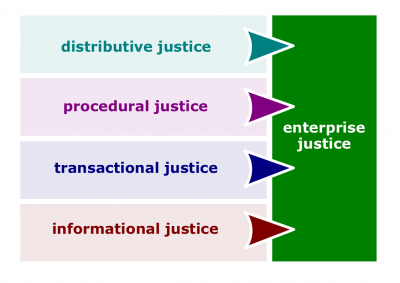Difference between revisions of "Enterprise justice"
(→Related coursework) |
(→Components) |
||
| Line 10: | Line 10: | ||
*[[Informational justice]]. The degree to which employees are provided truthful explanations for decisions. | *[[Informational justice]]. The degree to which employees are provided truthful explanations for decisions. | ||
*[[Procedural justice]]. The perceived fairness of the process used to determine the distribution of rewards. | *[[Procedural justice]]. The perceived fairness of the process used to determine the distribution of rewards. | ||
| − | *[[ | + | *[[Interpersonal justice]]. The degree to which employees are treated with dignity and respect. |
==Related concepts== | ==Related concepts== | ||
Latest revision as of 20:00, 5 January 2019
Enterprise justice (alternatively known as organizational justice; hereinafter, the Justice) is an overall perception of what is fair in the workplace, composed of distributive, procedural, informational, and interpersonal justice.
Definitions
According to Organizational Behavior by Robbins and Judge (17th edition),
- Organizational justice. An overall perception of what is fair in the workplace, composed of distributive, procedural, informational, and interpersonal justice.
Components
- Distributive justice. Perceived fairness of the amount and allocation of rewards among individuals.
- Informational justice. The degree to which employees are provided truthful explanations for decisions.
- Procedural justice. The perceived fairness of the process used to determine the distribution of rewards.
- Interpersonal justice. The degree to which employees are treated with dignity and respect.
